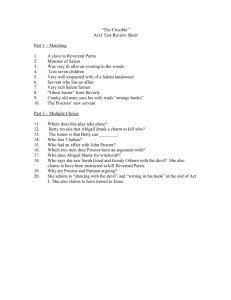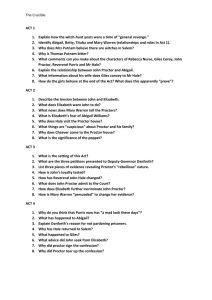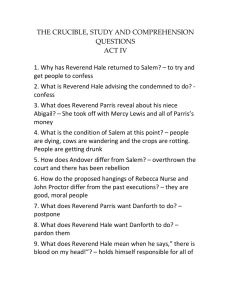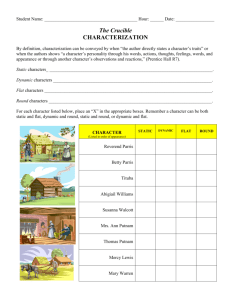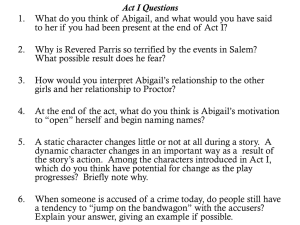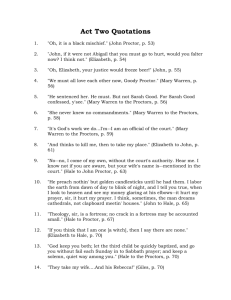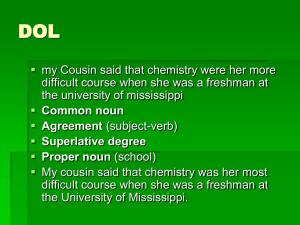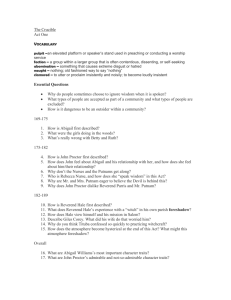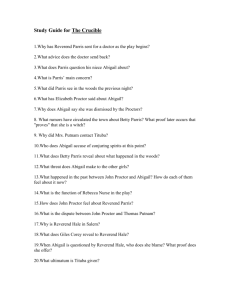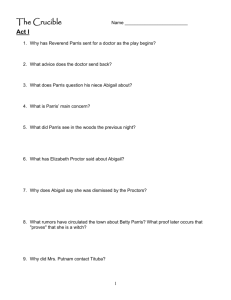The Crucible Questions.doc
advertisement
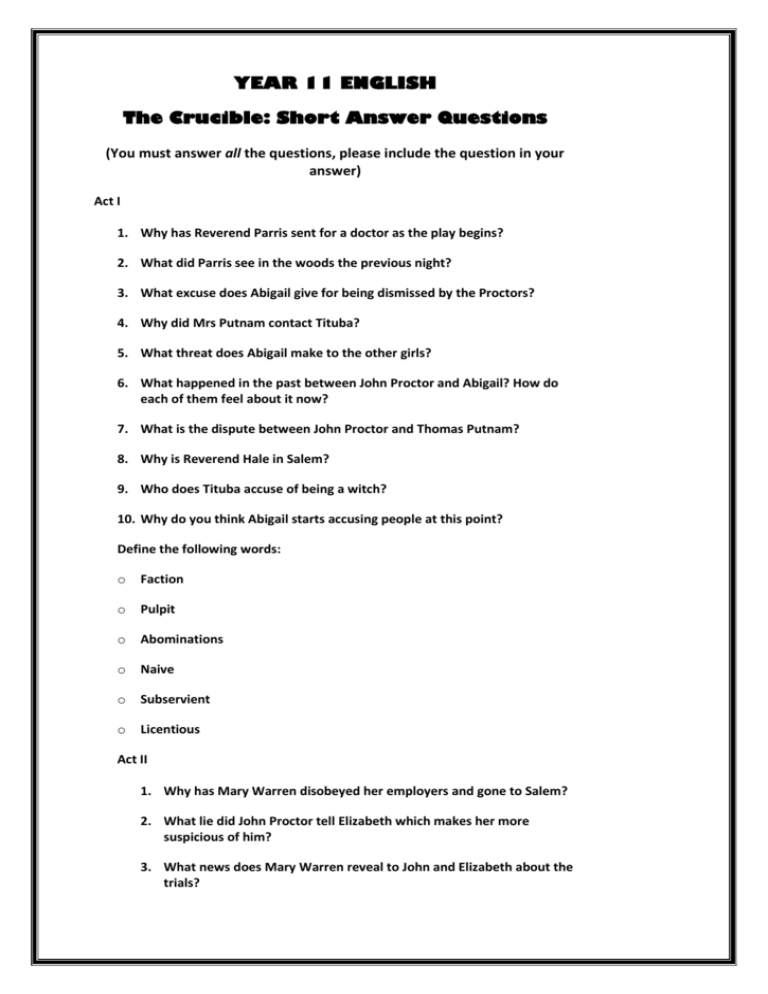
YEAR 11 ENGLISH The Crucible: Short Answer Questions (You must answer all the questions, please include the question in your answer) Act I 1. Why has Reverend Parris sent for a doctor as the play begins? 2. What did Parris see in the woods the previous night? 3. What excuse does Abigail give for being dismissed by the Proctors? 4. Why did Mrs Putnam contact Tituba? 5. What threat does Abigail make to the other girls? 6. What happened in the past between John Proctor and Abigail? How do each of them feel about it now? 7. What is the dispute between John Proctor and Thomas Putnam? 8. Why is Reverend Hale in Salem? 9. Who does Tituba accuse of being a witch? 10. Why do you think Abigail starts accusing people at this point? Define the following words: o Faction o Pulpit o Abominations o Naive o Subservient o Licentious Act II 1. Why has Mary Warren disobeyed her employers and gone to Salem? 2. What lie did John Proctor tell Elizabeth which makes her more suspicious of him? 3. What news does Mary Warren reveal to John and Elizabeth about the trials? 4. What does Elizabeth realise when she finds out that she has been accused? 5. What does Elizabeth ask John to do? 6. What (specifically) has Rebecca Nurse been accused of? 7. Why has Martha Corey been accused? 8. Explain why Cheever is both astonished and afraid when he finds the poppet with the needle in it. 9. Why does Mary Warren warn John about testifying against Abigail? 10. What does John decide to do? Define the following words: o Pious o Evasive o Tainted o Begrudge o Bewilder o Vindictive Act III 1. As this act opens, what accusations does Giles Corey make against Thomas Putnam? 2. What two pieces of evidence are brought out against Proctor in regard to his Christian nature? 3. What news does Danforth tell John Proctor about Elizabeth? What deal does he try to make with him? 4. What does Danforth think accounts for Mary Warren’s appearance in the court? 5. When Mary Warren says that she pretended to faint in court, what is she asked to do? What is the result? 6. What does Abigail do when the suspicion that she might be pretending falls on her? 7. What does John Proctor do to discredit her? 8. What happens when Reverend Hale states that Abigail has always seemed false to him? 9. What does John Proctor mean when he says, “God is dead!”? 10. What does Hale do when Proctor is arrested? Define the following words: o Prodigious o Reproach o Contempt o Lecher o Harlot o Denounce Act IV 1. Why has Reverend Hake returned to Salem? 2. What is Reverend Hale advising the condemned to do? 3. Why does Danforth refuse to postpone the hangings? 4. What does Reverend Hale mean when he says, “There is blood on my head!”? 5. What do Hale and Danforth request of Elizabeth proctor? 6. What happened to Giles Corey? 7. What is Elizabeth’s proof that John is a good man? 8. How has Elizabeth changed since we first met her? 9. After John confesses, what does Danforth want to do with the signed confession? 10. Discuss why John Proctor exclaims, “I am John Proctor! You will not use me!” Define the following words: o Incredulous o Adamant o Calamity o Prevail o Gibbet THE CRUCIBLE: Extended Answer Questions (You must answer 4 out of the 6 questions in extended detail - at least half page for each question) 1.a. A static character is one who remains essentially the same throughout a play. A dynamic character is one who changes and grows. Classify each of the following characters as static or dynamic and explain your choice with specific details. (1) Abigail Williams (2) Rebecca Nurse (3) Reverend Hale (4) Reverend Parris b. Agree or disagree with the following sentence and explain. "Elizabeth Proctor exhibits elements of both the static and dynamic character." 2. A crucible may be defined as "a severe, searching test." a. Define the test in this drama. b. Is it different for different characters? c. Some characters pass this test and others fail it. Choose one example of each and explain your choice. 3. a. An act in a drama often ends on a note of both interest and anticipation. Do each of the first three acts end in this manner? Explain. b. What are your thoughts and feelings at the end of the play? 4. a. Arthur Miller seems to know human nature well. What might have motivated the young girls in the play to be attracted to witchcraft initially? b. Why might they have "cried out" the women in the community as witches? What did they have to gain? c. How does Mary Warren feel about her role in the court proceedings? Why might she consider this to be an attractive position? 5. At the end of the play, John Proctor says of himself, "I do think I see some shred of goodness in John Proctor." What actions have led him to make this observation about himself? 6. If you have studied the Senate hearings on possible Communist sympathizers in the United States in the 1950's, what parallels may be drawn between the events in the play and these hearings?


